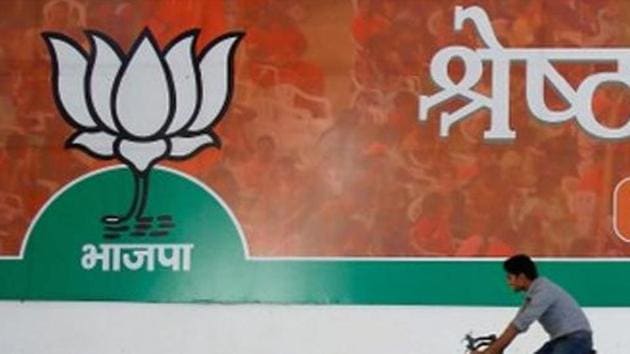BJP pays price for agrarian distress, employment crisis
The party’s disappointment stems from the fact that it has lost three chief ministerial chairs to rival Congress.
The Bharatiya Janata Party (BJP) is disappointed with Tuesday’s results to elections in five states but it hasn’t lost hope.

The party’s disappointment stems from the fact that it has lost three chief ministerial chairs to rival Congress. It is for the first time after Narendra Modi’s coronation as Prime Minister in 2014 that Congress has snatched a state – three in this case – from the BJP.
But the party remains hopeful of a better show in the general elections next year when people vote to decide whether Modi remains Prime Minister or not. Assembly elections, party strategists insist, have different dynamics and are fought mostly on local issues.
Watch: Election result clear message for PM Modi: Rahul Gandhi after two states win
The strategists admit they failed to anticipate the impact of Congress’s farm loan waiver promise in Madhya Pradesh, Chhattisgarh and Rajasthan. “The Congress managed to sway the rural population,” a senior BJP leader in Delhi said on the condition of anonymity.
“It had a huge impact in Chhattisgarh. Madhya Pradesh and Rajasthan were impacted, too.”
In Madhya Pradesh, unrest among upper castes over chief minister Shivraj Singh Chouhan’s strong pro-reservation line, a tussle in the aftermath of the Supreme Court judgment diluting the SC/ST (Prevention of Atrocities) Act, and the killing of protesting farmers in police firing had an impact on the voters, according to election strategists.
As for Rajasthan, it was lost from day one, two other BJP leaders said, attributing this to the unpopularity of chief minister Vasundhara Raje.
It was for the first time in a long time that the Centre and the states (Madhya Pradesh, Chhattisgarh and Rajasthan) were aligned, said Neelanjan Sircar, senior fellow at the Centre for Policy Research, but voters felt not much had been done on the development front. “The BJP surely was without an excuse. We saw frustration among farmers during the Gujarat assembly election, which has now spread to non-farming communities and urban areas as well. This can directly be attributed to the BJP’s performance on economic matters,” he said.
The BJP sensed trouble in Chhattisgarh closer to polling dates when farmers did not turn up to sell paddy at government counters, but didn’t expect to be swept away in the state, the first BJP leader said.
Read more: Three-time chief minister Raman Singh’s dream run ends
In hindsight, the strategists admit, the party could have selected better candidates in the state. “There was a definite fatigue about the BJP government and legislators in Chhattisgarh,” a fourth BJP leader said, asking not to be identified.
In Chhattisgarh, the strategists said, the BJP was convinced the alliance between Ajit Jogi and the Bahujan Samaj Party (BSP) would eat into the Congress’s vote share. In fact, the alliance ate into its own share.
In Rajasthan, the disconnect between Raje and other party leaders began shortly after her government was sworn in, but things came to a head only after the BJP lost the by-election to two parliamentary and one assembly constituency earlier this year.
“It was only after the loss that alarm bells started ringing in the party headquarters in Delhi. Before that, nobody was even listening to the complaints of the party’s elected representatives,” a Lok Sabha MP from Rajasthan said on the condition of anonymity.
Read more| How the Congress’ performance in this election alters calculus for 2019
The strategists said a few months after the bypoll, the party went in a tug-of-war between Raje and the party’s national president, Amit Shah, over the selection of a new president of the Rajasthan unit of the party. Raje eventually had her way.
“Raje had several achievements to show, but there was a certain perception problem that she faced. Her media management was bad,” an aide of the chief minister said during the campaign.
Madhya Pradesh CM Chouhan didn’t suffer any such problem. His popularity rating was high, but there was strong anti-incumbency at play, a fifth BJP leader said. The party had been in power in the state since 2003.
Still, the party’s tally would have been lower if not for Chouhan, this person added.
The strategists say that even in Rajasthan, the damage control done by Shah in the few months preceding the election helped the BJP regain ground. “The final numbers are not as bad as we had thought they would be,” a sixth BJP leader said, asking not to be identified
For more on Assembly elections, click here.




